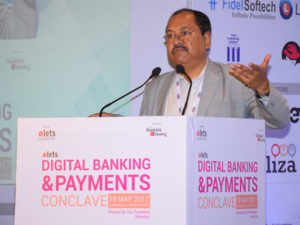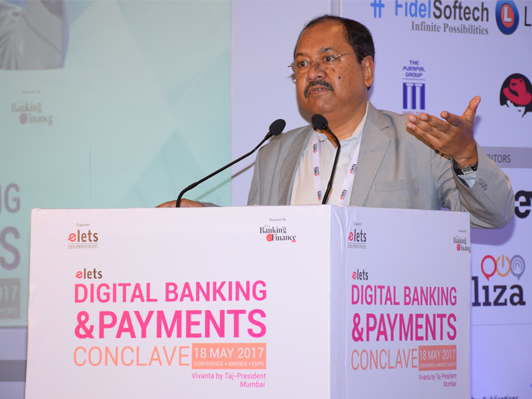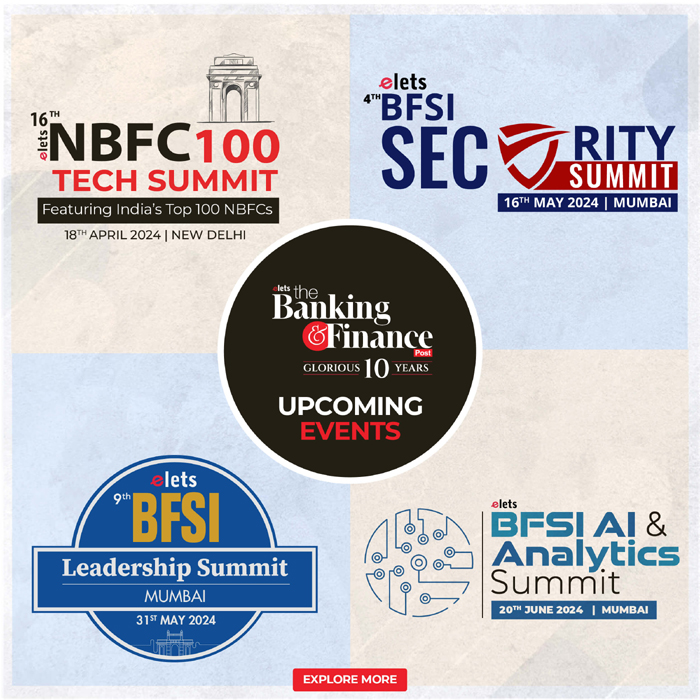 Demonetisation has given greater impetus to digital transactions pertaining to the financial segment. The acceptance of digital payments has grown in sync with the rising availability of relevant infrastructure, says Subrata Gupta, Chief General Manager, National Bank for Agriculture and Rural Development (NABARD), in conversation with Harshal Yashwant Desai of Elets News Network (ENN).
Demonetisation has given greater impetus to digital transactions pertaining to the financial segment. The acceptance of digital payments has grown in sync with the rising availability of relevant infrastructure, says Subrata Gupta, Chief General Manager, National Bank for Agriculture and Rural Development (NABARD), in conversation with Harshal Yashwant Desai of Elets News Network (ENN).
Share details about your institutional development initiatives.
NABARD was established in 1982 with its prime focus on refinancing. Over the years, the institution has diversified and today we are focusing on areas like tribal development, watershed development, Self Help Group -Bank Linkage and financial inclusion, rural non-farm sector development, climate change as well as infrastructure financing. We have also made forays into supporting producer organisations that are considered as the future. We also continue to provide refinancing services. All this is being done over and above the role we play in the area of institutional development and supervision of rural financial institutions.
How has demonetisation affected the overall economy in the long run?
Demonetisation has given greater impetus to digital financial transactions. We see higher acceptability of digital modes of payment with rising availability of relevant infrastructure. However, with cash coming back to the system, there has been a fall in digital payments as compared to the levels it had reached during the period of the cash crunch. This has also taught us a lesson that if we face problems in cash transaction then we can adopt digital payment. The government has now decided to incentivise banks and merchants for Aadhaar based payments so as to enable more people to participate in digital banking.
NABARD has recently tied up with Fino Paytech to facilitate the rural banking digitisation drive. Tell us about the progress of the project?
NABARD is extending grant assistance to banks for deployment of two lakh PoS/mPoS devices in one lakh villages and in Tier 5 and 6 centres. NABARD is also extending its support through microATMs to Regional Rural Banks (RRBs) and Rural Cooperative Banks (RCBs). However, there is no direct tie-up with Fino Paytech. The genesis of the supposition may be a news article in April 2017 : with the headline ‘Fino Paytech to help NABARD digitise rural banks across five states’. In fact, Fino Paytech will be tying up with district central cooperative banks and their primary agricultural Credit Societies for providing Aadhaar enabled microATMs and financial inclusion gateway services to them. The decision of tie up of such kind, if any, rests with the banks and not NABARD’s.
Tell us about the EShakti initiative.
The Self Help Group-Bank Linkage Programme (SHG-BLP) was the first savings-led microfinance model in the world purveyed through the mainstream banking system of the country. It was also a major step towards gender sensitive financial inclusion way back in 1992. Promotion of SHGs is process oriented and focusses on building credit discipline, starting with savings and on-lending within the group. After its prolific expansion since pilot test for a period of five years (1987-1992), it was felt that the route to expansion of choices for clients and ease of appraisal by bankers should be digital.
EShakti is a project for digitising financial and non-financial records of SHGs launched by NABARD (www.eshakti. nabard.org). The EShakti programme is a multi-stakeholder exercise with NGOs, technology service provider, SHGs, banks, government agencies and NABARD for digitisation of various aspects of SHGs. The records created speed up the appraisal and sanctioning process of loans at banks as well as help in evaluating the individual members taking into consideration of their financial behaviour, which is necessary in order to become direct customers of the bank.
Which are the other initiatives undertaken by NABARD to make its operations digitised?
NABARD has an online human resource system as well as an accounting system in place. A data collection platform helps in collating data from the banks. Furthermore, we are in the process of putting in place a document management system as well. This would more or less cover all aspects of day to day work. In future, the bank also has to get into data mining for faster and more precise analysis of data.
How has been the response for RuPay Kisan Credit Cards (KCCs)?
What was the idea behind launching this card? KCC was launched in 1998 to give flexibility to the farmers in drawing the loan amount as per their requirement. The shortterm loan became more like a credit limit. In 2012, NABARD pushed for the issuance of RuPay KCCs by banks against their KCC accounts in order to enable farmers to transact on the digital platform. In the light of Prime Minister Narendra Modi’s recent announcement, NABARD is aiming for 100 per cent coverage of KCC accounts with RuPay KCCs in all banks. The commercial banks and RRBs have covered all the KCC account holders. Rural Cooperative Banks are expected to cover their customers by June-July, 2017.
Tell us about your activities in tribal welfare sector and water campaign?
Based on the successful experience of Adivasi Development Programmes, NABARD went for replication of “Wadi” model across the country. “Wadi” model is a comprehensive programme that has helped in improving living standards of marginalised tribal families in remote areas. The word “Wadi” means orchard. Usually Wadi model follows a one acre norm based on following considerations:
- Most poor tribal families own small plots of land
- Around 40 to 80 fruit trees can be planted in a plot of oneacre. This is the minimum needed for getting enough income from horticulture, with low investment and low annual expenses
- A family with at least two working adults can take care of these fruit trees
- The plants take about five years to start bearing fruits. During this intervening period, tribal farmers are encouraged to go for inter-cropping with vegetables so as to enable them to have a source of income
NABARD has been involved in water management projects for a long time. NABARD started its Indo-German Watershed Development projects started during 1990s. The aim was to have an integrated and comprehensive development of micro watersheds, which included mobilisation of rural communities through village watershed committees (VWCs)/NGOs to make people own the project.
NABARD has recently launched a water campaign that aims to spread awareness among farmers about increasing productivity and livelihood by conserving water. It will be covering one lakh villages in the most vulnerable/water scarce/rain-fed districts in 21 major States with the support of other stakeholders.
NABARD’s regional offices will hold meeting with stakeholders to strategise and solicit support, identify local volunteers, and extend benefits of ongoing schemes to villages and aid credit facility for creating water management structures if needed.
Share with us details about your institutional development initiatives?
As part of our institutional development initiative, 201 RCBs in 16 states completed CBS with Application Service Provider model. NABARD pushed for CBS adoption in order to introduce modern banking in the rural cooperative sector. It enabled them to go ahead with technology adoption and provide anytime anywhere banking, RTGS/NEFT, etc, to their customers and also enabled them to optimise their manpower requirement. Setting up of V-Sats in Business Correspondent points and PoS/mPoS devices at merchant outlets in Tier 5 and 6 centres have also been supported by NABARD to give a boost to the digital infrastructure.
Elets The Banking and Finance Post Magazine has carved out a niche for itself in the crowded market with exclusive & unique content. Get in-depth insights on trend-setting innovations & transformation in the BFSI sector. Best offers for Print + Digital issues! Subscribe here➔ www.eletsonline.com/subscription/














